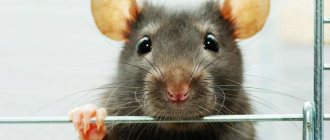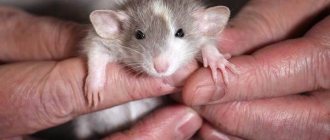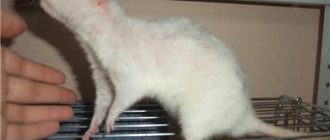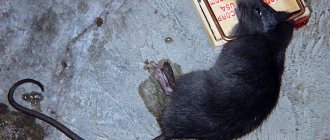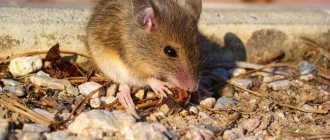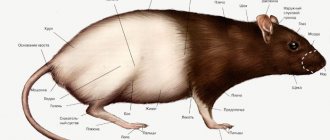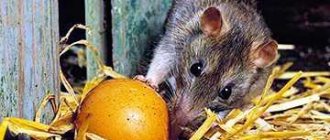The problem of unpleasant odor when keeping decorative rats
What affects the appearance of smell when keeping rats
1. Gender of the rat: Males usually smell stronger than females, especially during puberty (6-8 months), when they actively mark the territory, claiming their rights to it.
2. Health status: Healthy rats usually smell pleasant or not smell at all. The appearance of a pungent odor is a reason to be wary and watch your pets. For example, kidney disease can increase the unpleasant odor of a particular individual. In some cases, sick rats are also unable to ensure proper hygiene due to weakness.
3. Age of the rat: Old rats often smell stronger than younger ones, including due to illness and inability to engage in proper self-hygiene.
4. Individual characteristics of the character and behavior of the rat, its habits: there are clean rats and slutty rats. Sometimes a completely healthy rat can have an unpleasant odor due to an indifferent attitude towards its appearance. There are rats that have bad habits of pooping in inappropriate places.
5. The smell may depend on the color of the rat: rats of different colors often smell differently. There may be differences in odor between hairless, tailless and furry rats.
6. The smell of a particular rat may depend on its status in the rat family (pack).
7. Diet: The appearance of odor can be caused by certain foods. This may also be a signal that some food is not digestible or is not suitable for rats. Excess protein or sugars in the diet may also be one of the reasons.
8. The intensity of the smell from the cage may also be related to the time of year. I’m not completely sure about this, but it seemed that in winter the rats smell less. This may be due to seasonal changes in temperature and microclimate in the apartment. Also, in the hot and humid summer air, rat excrement dries more slowly, adding an unpleasant aroma. But the smell of rat sweat does not affect the overall picture. We can say that rats hardly know how to sweat at all.
9. Overcrowding of the cage or its insufficient size can cause an unpleasant odor, since the cage becomes dirty much faster than it is cleaned. And even in a normal-sized cage: the more rats, the more smell.
10. Unsuitable or low-quality cage filler may well be the source of an unpleasant odor when it does not cope with its function.
11. The cause of an unpleasant odor may also be insufficient frequency or thoroughness of cleaning the cage. When you clean the cage once every two weeks, even the cleanest and most tidy inhabitants will begin to stink.
Important !
- The fur of a healthy rat does not have an unpleasant odor, it smells of a specific musky aroma!
— The presence of paper, cardboard, or rags in the cage greatly enhances the unpleasant odor. If it is necessary to use the above materials in a cage, very frequent (daily) replacement is required.
— Frequently washing pets in the hope of reducing the unpleasant odor does not give positive results: the source of the odor is rat excrement, and not the rats themselves. Moreover, after bathing, rats begin to smell stronger, involuntarily releasing substances that contribute to the return of their natural natural odor.
— The use of perfumes, colognes, air fresheners and deodorants (except for specialized ones) cannot mask the unpleasant odor from a rat cage, but can quite possibly harm the rats themselves, cause poisoning, irritation of the skin and mucous membranes, and even lead to the death of animals. Never use such products on rats!
What does a domestic rat look like?
The appearance of the domestic rat has not undergone major changes compared to its wild relatives. Most animals have an elongated, stocky body and a long hairless tail covered with sparse bristles. The size of the animal can be from 8 to 30 cm, and its weight can be up to 400-500 g. The elongated head is crowned with round ears, the eyes are small and bulging. The jaw of rats consists of 4 front incisors and molars. Different breeds of decorative rats differ in the structure of their fur:
- smooth;
- thin and shiny;
- curly;
- downy
There are animals without hair, for example, sphinxes and rodents with mixed coats. Colors can be plain or mixed. From gray and brown to orange and blue.
The bald sphinx is a type of rat.
In Dumbo rats, the ears “sit” not on the top of the head, but lower, like those of elephants. As a result of the mutation, rats were born with no tail at all.
Causes of unpleasant odor
Among the reasons why an unpleasant odor appears, we can list those that relate to the pet and those that relate to the equipment.
If they talk about accessories, then note the following:
- some materials absorb and retain odors better, so even a washed cage can have an individual specific aroma;
- fillers can have both an unpleasant odor and enhance the acquired odor;
- In summer, due to rising air temperatures, microbes develop more intensively, which becomes the reason for intense aromatization.
Interestingly, fresh daytime urine does not stink. But overnight it decomposes and begins to release ammonia - the main source of stench, so thoroughly clean the cage once a week. Be sure to wash all surfaces with warm water and soap. Change the materials from which the rat makes its nest once every 2 days until the problem is eliminated. Wipe down the areas around the cage as well. When the male marks the territory, the spray spreads beyond the zone of tactile contact.
To prevent odors from escaping from the cage, use only bedding materials that are recommended for rats. They absorb secretions and minimize their odor. Also reduce the amount of cardboard, toilet paper and paper towels you give your pet. They entertain him a lot, but the cellulose absorbs urine and then “smells” very strongly.
If we talk about pets, then:
- some rats are more indifferent to their appearance and this can cause them to acquire a specific stench;
- males smell more intensely than females;
- certain breeds also have a stronger individual aroma;
- The smell of an older animal is more intense because it is not able to groom itself well.
What should a rat cage look like?
The optimal home for a rat would be a cage made of metal rods with a tray. Rats can climb on the grates, they are well ventilated and allow you to observe what is happening around. The distance between the rods should be about 1.5-1.7 cm (or less). If the bars are too thin (2 cm or more), the baby rats will try to crawl between the bars. At best, the pet will simply run away, and at worst, it will get stuck and suffer.
Excuse me, do you have anything tasty for the poor little rat?
In addition to size, the configuration of the cell is important. A flat (low) cage is not an option. No matter how big it is, the animals will be bored in it. Guinea pigs or hamsters live in fields, and the rat world is more complex and varied. The cage should have several levels.
A real palace for rats
- Glass containers (jar, aquarium, terrarium)
- Plastic container/dune
- Small cage for mice or hamsters
It is better if the metal rods are painted. Then they will not oxidize from the caustic urine of animals, and there will be no stains on them.
“I’m sitting behind bars in a damp dungeon.” Painted rods are the best option for rats.
There are two types of cage trays: with and without a false bottom. The false bottom is designed like this: the animals run along the grate, the tray is located below. The mesh should be fine enough so that the rats do not fall through with their paws. But not too much - so that feces fall through.
- Rats are always clean;
- You can use any type of filler;
- The filler is not scattered around the cage;
- Convenient to clean.
- An unsuitable grid can cause damage and inflammation of the skin on the paws - pododermatitis;
- Potential possibility of injury (dislocations, fractures);
- Rats are deprived of the opportunity to rummage through the litter;
- If a rat drops a treat from its paws, it is lost forever.
Overall, using a plastic false bottom seems like a great idea to me. It can be partially covered to make the rats more comfortable, additionally put paper towels in the cage for the house and hang hammocks for sleeping.
The shelves are lined with soft fleece fabric: it is soft, dries quickly, and does not tangle your paws
How to get rid of the pungent odor of males
It is impossible to get rid of the smell of a male. Every animal has its own natural scent. If its smell increases, then it is needed for something in nature. For example, to attract a female during the mating season. Attempts to wash it off by bathing will cause the body of a male rat to begin to produce the desired aroma with a vengeance, so it is better to focus on regular cleaning of the cage and purchasing high-quality litter.
If you keep your pet clean and it is not sick, then there will be no unpleasant odors. Be sure to pay due attention to the hygiene and health of your pet, as well as its living conditions. If you are afraid that your pet will stink, then opt for another type of animal.
Source
Do pet rats bite?
They bite, but extremely rarely. There are a number of cases when a rat can bite:
- fright;
- pain;
- error. The animal tastes everything, so a finger inserted through the bars can be perceived as food;
- transitional age in males. From 5 months, males can bite in an attempt to dominate;
- female pregnancy. A pregnant and lactating female is able to claw, protecting the offspring.
Rats nip rather than bite
In almost all cases, the owner himself is to blame. Mild biting by animals is a form of communication. The pet is trying to attract the attention of its adored owner.
Important! Physical punishment for a bite is the biggest mistake: a rat may lose trust in a person.
In the case of dominance, you can either turn the “impudent” guy onto his back and hold him in that position or sprinkle him with water. Usually it is enough to drive the pet away from you or stop playing with it.
Do rats like to be petted?
Tame animals gladly accept affection from their owners, especially if they do not try to lift them by the tail. You should pick up the rat with both hands: it often climbs onto your outstretched palm. In order for a rat to like it, you need to stroke its head, scratch it behind its ears and on its cheeks. The animal enjoys a gentle touch on the withers and stroking the back in the direction “from the head”. Some animals trust their owner to scratch their belly, but not all. You can observe the social interactions of rodents to understand what they like.
Rats love affection
How to walk a rat
It is better to refuse to walk a rat on the street: it is too dangerous: the animal can “pick up” an infection on the ground or in the grass. Any noise can cause panic, and the animal will run away. There is a category of pets that feel comfortable in their bosom. You can go out with such rodents in warm weather without putting them on the ground. However, it is better to carry your pets in a carrier.
A rat can only walk on your shoulder
For home leisure, you need to fence off the walk in a room where there are no wires or dangerous objects. You can release the animals on the sofa or table, but make sure that they do not fall.
Signs of a Dead Rat Under the Floor
An unpleasant smell in a room forces a person to open windows, use air fresheners, and look for the cause of the stench. It’s easy to tell what a dead rat smells like. The body begins to stink so much that nothing helps.
Every day the stench gets worse, it’s impossible to stay in the room. The smell of rotting hurts the nose, causes nausea, and the urge to vomit. The room smells of rot, corpses, mice. You can feel it 3 days after the death of the rodent. As the body decomposes, the stench intensifies and envelops the entire room. The smell of a dead rat is impossible to miss. The main difficulty is to find the location of the corpse.
On a note!
A rat can die under the floor of a multi-story building or in the basement. The smell spreads throughout the entire entrance and throughout all apartments. Finding a corpse is much more difficult than finding it under the floor of a private house. In such cases, they often resort to the help of specialists.
Dead rat
When does the smell go away?
It is definitely impossible to answer the question of how long it takes for a rat to decompose and how soon the stench will disappear. This depends on several factors:
- Air temperature. The higher it is, the faster the process occurs.
- Rodent size. The stench from the corpses of small mice will go away in a few days, but an adult large rat can smell up to 10-15 weeks.
- If an animal passes into another world in an empty room, and the amber has managed to soak into the upholstery and furniture, then it is very difficult to get rid of it.
Boy rats smell strong
1. It’s worth putting up with.
Rats smell on their own. This cannot be changed. Some people smell this smell very well, while others don’t smell it at all - sensitivity to rat smell varies from person to person. If the husband smells it even when the cage is clean, then nothing will help him, just live with it somehow. Show in full. 2. you have males. In the very juice, so to speak, when a little less than half of them stink. Actually, this is the transitional age for rats. Gradually this will outgrow. There are no other ways, even castration will not help instantly, because it depends on the hormonal level, and it does not immediately change after castration. At the peak of hormonal activity, it will take a couple of months - exactly the same amount of stink that men smell without castration
3. Yes, rats piss and mostly “past the cash register.” There's nothing you can do, just go and wipe it. You can try laying rags in especially favorite places for pissing and replacing them with fresh ones once or twice a day.
Now how to live with this further. First of all, don't bother. The more you wash and spray something there, the more the rats don’t like it and the more they respond with their odors. Cleaning the cage is very roughly divided into three types:
— “Daily”: wiping shelves, cleaning trays/particularly poopy corners in the filler. If necessary, change the bedding in the houses, on the shelves, etc. All this is done once a day or every other day, depending on how much of an asshole the rats are.
— “Weekly” means changing hammocks, changing filling, washing accessories. Done once or twice a week. Usually once a week is enough, but special assholes need to wash or replace something twice or somewhere between washes.
- “Monthly” or so-called deep cleaning. This is exactly what it means: soaking the entire cell with a complete change of everything and everywhere. The funny thing is that if everything else can be done anyhow, then deep cleaning should not be done more than once a month. And after each such cleaning, be sure to leave an unwashed house or a stale hammock in the cage. Or scatter a bit of old filler over fresh filler. This is necessary so that the rats do not panic, being left without the native smell of their home.
Based on this, there is no need to try so hard to maintain perfect cleanliness. Be patient for a week without fanaticism in cleaning, then you will feel better.
About hammocks and all that. I already said about the shelves - put rags in the most pissy corners, yes. And place napkins or paper towels in the houses and hammocks. It is convenient to glue cheap cotton-based pads into plastic houses and satellites. Ola classic without wings in an economy pack as an example
but this is only suitable for non-chewing rats. Paper and cotton wool are not the best for odor control, but combined they help.
And in general. The worst smell is rat urine. And it stinks worst of all if it stagnates somewhere and cannot dry out. Watch the cage carefully and look for such places. As a rule, these are stupid hammocks and beds with padding polyester and/or faux fur, especially if the backing is canvas. For accessories, choose fabrics that easily absorb moisture and dry quickly. You should discard beds if rats urinate on them. Urine also flows perfectly into all sorts of joints and crevices. They should be covered with something, even with a rag, or the house/tray should be placed in the wrong place.
Source
Removing a dead rodent
When the corpse of a rat or mouse is found, it must be immediately removed from the house, while not forgetting about safety measures. It is imperative to work in rubber gloves and a respirator, since the risk of contracting an infection carried by rodents remains even after the death of the animal. The body is carefully placed in a bag, which is sealed and either buried outside the living area or thrown into a trash can.
Finding a dead mouse or rat under the floor is quite difficult, since it is impossible to determine the exact place where it lies. If there is such an opportunity, then it is better to open the floor in the center and look under it with a long stick for where the corpse lies, checking all the corners.
If the deceased rodent was on the ground, then its top layer is thrown away along with the animal.
Potassium permangantsovka
Potassium permanganate is used almost everywhere: small children are bathed with it, they drink it for intestinal disorders, it is used for disinfection, and much more. In addition, potassium permanganate copes with the destruction of stench much better than some odor neutralizers. Therefore, if a rat died under the floor or behind a wall, and the corpse began to emit a stench, potassium permanganate is perfect.
To remove the smell, it will be enough to simply wash the floors and baseboards in those places where rats most often ran, and spray it into those places (cracks) where the corpse of a rodent may be located. In addition, potassium permanganate will also destroy most of the harmful bacteria that parasites might leave behind, so the risk of becoming infected with something in the future is reduced to zero.
Potassium permanganate (potassium permanganate)
Degu
Degus are rare domestic rodents, very active, cute, easily tamed animals. This rodent, like a chinchilla, needs a spacious cage with a house, a drinking bowl, a wheel and other toys for active games. A degu should always have specialized food in its feeder consisting of herbs, cereals and vegetables, as well as hay and branches for grinding down teeth. But sweet fruits and dried fruits are contraindicated for these rodents due to their predisposition to diabetes.
Degus are very sociable and get used to the hands of their owner and can recognize him by smell. This pet is a social animal, so it requires constant communication either with other degus or with its owner. Therefore, if you do not have enough time for your pet, buy him a pair.
Is it possible to transport rats on an airplane?
Theoretically it is possible, but it is a troublesome task:
Find out whether it is possible to transport a rat according to the rules of this airport. Find out whether your carrier transports rats. Obtain a veterinary certificate for the rodent 3 days in advance. Before check-in, go through veterinary control at the airport.
Do not forget about the laws of another country, whether the animal will be allowed there. It can only be carried in the cabin; it will not hold up in the luggage compartment. Don't put your rat through the scanner, it will hurt it. Don't open your rat's carrier on an airplane. It can only be fed through the grate.
Rats are reluctantly allowed on planes
Problems are easier to solve if you can reach an agreement with the aircraft crew.
Boy rats smell strong
For beginner dog breeders
Aquarium equipment
Do pet rats stink?
Pet rats are not smelly animals at all. Their natural odor is musky. If they smell bad, then there are only a few possible reasons for this phenomenon - an uncleaned cell or disease. Read more about why a pungent odor occurs and what to do to eliminate it.

